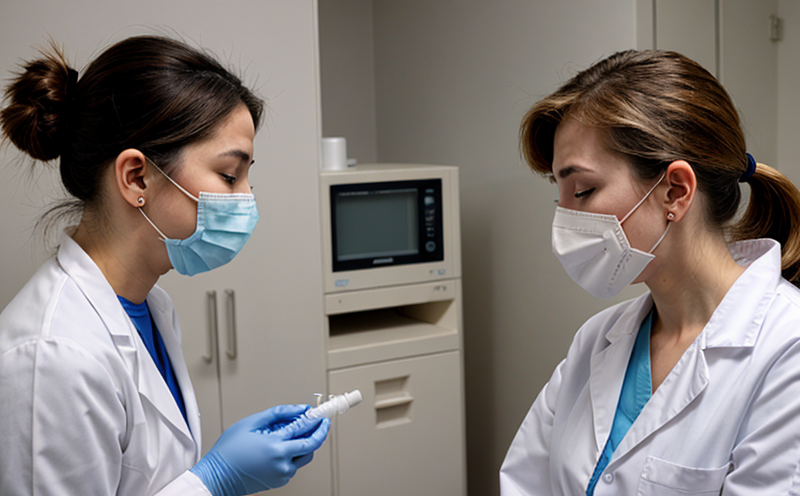Antibody Response Testing in Veterinary Vaccine Trials
The development of effective veterinary vaccines is a cornerstone of modern animal healthcare. Ensuring that these vaccines are safe, efficacious, and capable of eliciting an appropriate immune response is crucial for public health and the welfare of animals. Antibody response testing plays a pivotal role in this process by providing quantitative and qualitative insights into how well the vaccine induces a protective immune response.
In veterinary vaccine trials, the primary objective is to assess whether the vaccine can elicit an adequate level of antibodies that will protect against specific pathogens. This involves measuring both the quantity (titer) and quality (specificity and avidity) of antibodies produced by the vaccinated animals. The testing process typically follows a structured protocol designed to ensure consistency and accuracy.
For this purpose, specialized laboratories employ state-of-the-art equipment such as ELISA (Enzyme-Linked Immunosorbent Assay), Western Blotting, and Flow Cytometry to analyze the antibody responses. These tests help determine the presence of specific antibodies directed against key antigens within the vaccine formulation.
The importance of accurate testing cannot be overstated. Inadequate or suboptimal immune responses can lead to ineffective vaccines that do not provide sufficient protection, potentially leading to outbreaks of diseases in animal populations. Conversely, overly strong immune responses may cause adverse reactions in vaccinated animals, which is undesirable and must also be avoided.
The process begins with the selection of appropriate test antigens, often derived from the target pathogen or recombinant proteins. Specimen preparation involves collecting blood samples from vaccinated animals at various time points post-vaccination. These samples are then processed to isolate serum for analysis.
ELISA is commonly used to measure the concentration of antibodies in the serum. This method detects antibodies that bind specifically to the target antigen, providing a quantitative measure of the immune response. Western Blotting can further confirm the presence and specificity of these antibodies by visualizing their interaction with specific antigens on a protein gel.
The quality of the antibody response is also assessed using techniques like Flow Cytometry. This method measures the avidity (strength) of the antibody-antigen bond, which is critical for determining the functional activity of the antibodies produced by the vaccine. Avidity tests help ensure that the antibodies generated are not only present but also capable of effectively neutralizing the target pathogen.
Accurate and reliable results from these tests are essential for regulatory approval and widespread adoption of veterinary vaccines. The use of international standards such as ISO, ASTM, EN, and IEC ensures consistency and comparability across different laboratories and regions. This standardization is vital in a globalized market where the efficacy and safety of veterinary products must be universally recognized.
Understanding the nuances of antibody response testing requires expertise in both immunology and laboratory techniques. Our team of experts brings together these disciplines to provide comprehensive and accurate results, ensuring that the vaccines under development are safe and effective for use in animal populations.
Why It Matters
The success of veterinary vaccine trials hinges on the ability to accurately assess the immune response elicited by the vaccine. Antibody response testing is critical because it directly informs the efficacy and safety profile of the vaccine. By quantifying the levels and types of antibodies produced, these tests help determine whether the vaccine will provide adequate protection against targeted pathogens.
Accurate testing ensures that only vaccines with robust immune responses proceed to further stages of development or commercialization. This not only enhances public health but also protects animal welfare by preventing outbreaks of diseases. In addition, regulatory bodies rely on these test results to approve and monitor the safety and effectiveness of veterinary products.
The implications extend beyond just the immediate context of vaccine trials. Accurate antibody response testing can influence broader aspects such as herd immunity, public health policies, and international trade in livestock and pet animals. Ensuring that vaccines are effective is essential for maintaining a balance between animal health and economic stability.
Competitive Advantage and Market Impact
- Accurate and reliable antibody response testing enhances the credibility of vaccine developers in the market, leading to greater trust from regulatory bodies and the public.
- The ability to consistently produce high-quality results can differentiate a laboratory from its competitors, attracting more clients seeking robust data for their products.
- By ensuring that vaccines meet international standards, laboratories can open new markets and opportunities globally, enhancing their competitive position in the industry.
- Pioneering advancements in testing methodologies and technologies can secure a leading position in the market, allowing early entry into emerging trends and innovations.
Use Cases and Application Examples
Antibody response testing is widely used across various stages of veterinary vaccine development. From initial formulation to final product release, this testing ensures that the vaccine meets all necessary criteria for safety and efficacy.
In early-stage research, antibody response tests help identify optimal antigen combinations and dosages. This information is crucial for refining the vaccine formula before proceeding to larger-scale trials. During clinical trials, these tests monitor the immune responses in different populations, ensuring that the vaccine performs consistently across various demographics.
Post-market surveillance also benefits from antibody response testing by providing ongoing data on the vaccine’s effectiveness over time. This information is invaluable for identifying any potential issues and making necessary adjustments to improve the product.
A real-world example of the importance of this testing can be seen in the development of a vaccine against Canine Parvovirus (CPV). By measuring antibody titers in vaccinated dogs, researchers were able to determine that the vaccine effectively induced protective levels of antibodies. This led to its successful commercial release and widespread use.
The same principles apply to other large-scale animal diseases such as Foot-and-Mouth Disease (FMD) and Avian Influenza (AI). Antibody response testing ensures that these vaccines are effective in preventing outbreaks, thereby protecting both livestock and public health.





